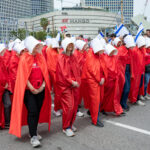Migrant workers from many countries have build up Dubai from a petty sheikhdom to a futuristic city. Their protests have exposed the grim conditions behind the glistening mirage. – Editors
 Under a blazing Arabian sun was built the world’s tallest building, the Burj Khalifa in Dubai, which opened in January 2010. It symbolises the extremely rapid capitalist development of this city-state in the United Arab Emirates, now famous for its artificial islands, skyscrapers and shopping malls, as a centre for business, tourism, luxury homes and extravagant consumption – and increasingly infamous for the atrocious conditions endured by the army of migrant workers who are there to build the place or provide services to residents and tourists.
Under a blazing Arabian sun was built the world’s tallest building, the Burj Khalifa in Dubai, which opened in January 2010. It symbolises the extremely rapid capitalist development of this city-state in the United Arab Emirates, now famous for its artificial islands, skyscrapers and shopping malls, as a centre for business, tourism, luxury homes and extravagant consumption – and increasingly infamous for the atrocious conditions endured by the army of migrant workers who are there to build the place or provide services to residents and tourists.
Construction workers come from Bangladesh, India, Pakistan and other developing countries. Promised good jobs and wages by recruitment agencies, many pay £2000 ($3100) or more for a job in Dubai. Raising such a sum often means selling family land or borrowing from a moneylender. Arriving in Dubai, workers are required to surrender their passports to the construction companies. This is illegal, but what normally happens. Workers are trapped by the need to pay off their debts and pay for their flight home. In effect, this has created a bonded labour system.
Conditions in the camps where the workers are housed are literally shitty, with blocked toilets and overflowing sewage. Different eyewitness accounts in National Geographic, the Independent and BBC Panorama all describe the same noxious conditions.
During the summer, temperatures soar above 45 Celsius (113 Fahrenheit), and visitors are advised to walk outdoors only in the evening, and drink water continually. Heat stroke is a killer for workers doing heavy physical labour for shifts of 12 hours or longer.
How many died to build Dubai? In 2006, Human Rights Watch issued a report, Building Towers, Cheating Workers, which cited official statistics from the Dubai authorities, according to which there were 34 deaths on construction sites in 2004 and 39 in 2005. The report went on to give reasons for believing that actual mortality was much higher. It cited a report by the journal Construction Week, which found that 880 migrant construction workers died in the UAE in 2004. HRW also quoted an official of the Indian consulate in Dubai as saying that it registered 971 deaths in 2005, of which 61 were registered as site accidents. Johann Hari, writing in the Independent, reported being told of “a huge number of suicides in the camps and on the construction sites”.
Workers have protested by going on strike, marching, damaging property. The pattern is similar to emerging protests in some of their home countries: Bangladesh, China.
Workers in the massive services sector are a different mix of nationalities: more South-East Asians and recently Ethiopians. A particularly vulnerable group are women working as domestic servants, who face problems including confiscation of passports, long hours, meagre wages (which may be paid late or not at all) and assault by employers.
Politically, Dubai is an absolute monarchy, ruled since 1883 by the Al-Maktoum family, and since 2006 by Sheikh Mohammed. In some respects it is an enclave of multiculturalism and relative tolerance in the Middle East; there are Christian, Hindu and Sikh places of worship, and non-Muslims are permitted to buy alcohol. But the press is restricted and trade unions and political associations remain illegal. At one stage the government talked of legalising trade unions, but later went back on this.
Dubai’s demography is extraordinary. Of a total population of 1.48 million, about 90 percent are expatriates from over 160 countries. For Emirati citizens, this is the ultimate welfare state, with housing, health care and education up to PhD level all provided free by the government.
There is a large middle class of managers, professionals and skilled workers. Perhaps surprisingly, only a minority of this layer are from the West; most are Indians and Iranians. These people enjoy a privileged lifestyle (not least because they can employ domestic servants to do all the chores), which gives them a vested interest in the status quo.
Dubai is not an oil economy. Although oil revenues provided the initial start-up capital, the economy revolves around finance, real estate, tourism and commerce. Moreover the construction boom was funded by debt and boosted by speculation on rising property prices. So Dubai was hard hit by the financial crisis and recession, and had to be bailed out by its oil-rich neighbour, Abu Dhabi.
Construction companies affected by the financial crisis have defaulted on paying their workers’ wages. Many workers have gone unpaid for months, eventually being sent home without receiving overdue wages. In May 2010, 95 Vietnamese workers were arrested after blocking the gates of the Ministry of Labour. They were employees of the South Korean company Sungwon, and had not been paid for three to four months.
An international working class is in the process of formation in Dubai and the other Gulf states. These workers have begun to fight against their exploitation and mistreatment, and will be a force to be reckoned with in future. They need and deserve international support and solidarity.






0 Comments